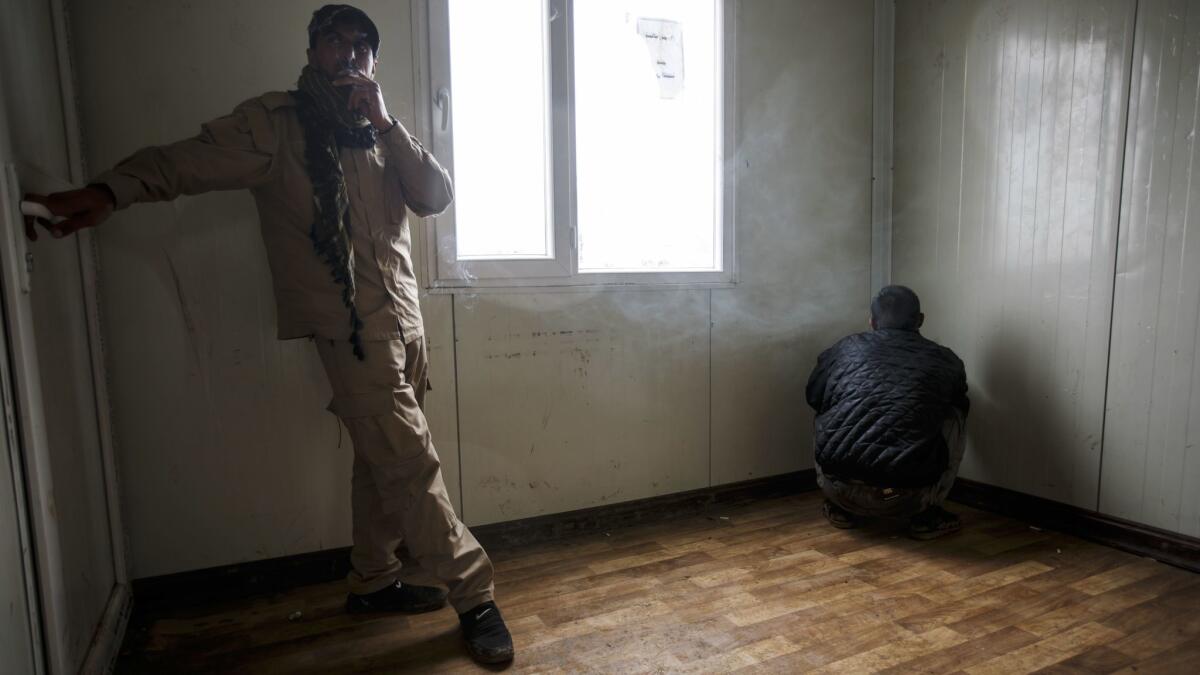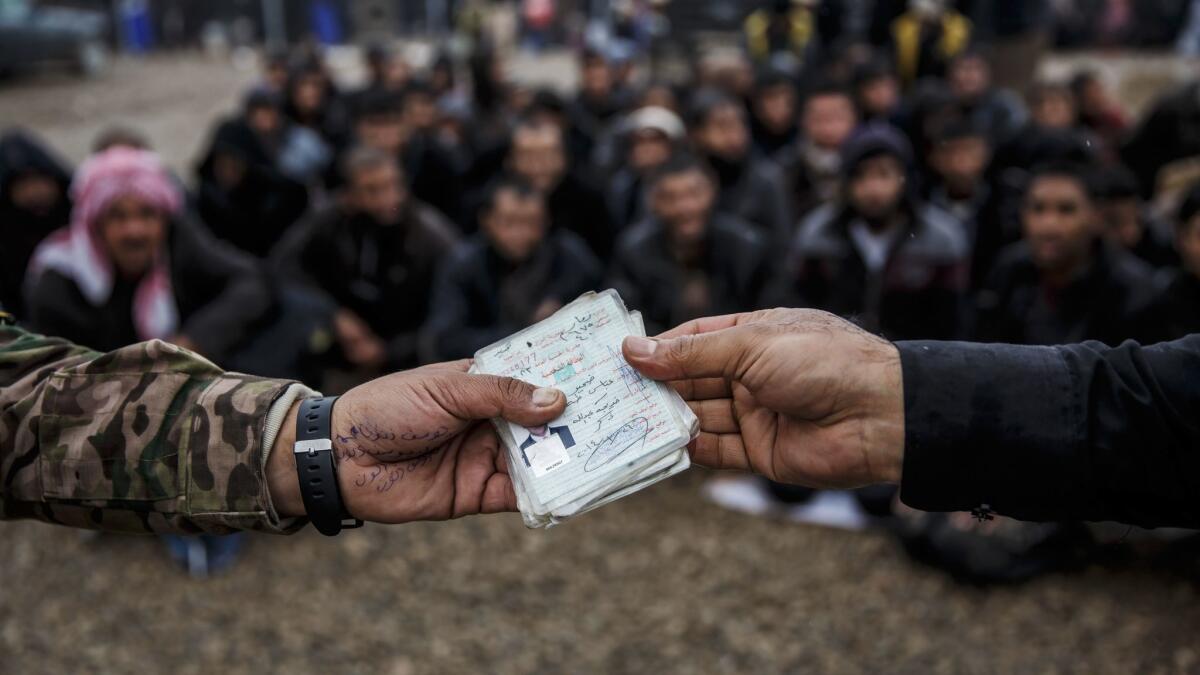With the battle for Mosul finished, Islamic State families present a conundrum

Reporting from Mosul, Iraq — Salhah Younes gazed at her three grandchildren, her mouth puckered in a tight frown as she watched them fidget by her feet.
Near her stood an intelligence officer who gave his name as Col. Ahmad.
“Was anyone in your family Daesh?” he prompted, employing an Arabic acronym for Islamic State.
Younes looked up, her face defiant.
“Yes, my son was Daesh,” she said. “And these are his kids.”
The defiance was soon replaced by the uncertainty at what Younes now faced in the wake of the battle for Mosul, the city where the jihadis had mounted a long and punishing defense over the last eight months against U.S.-backed Iraqi troops.
With the fighting in Mosul finally finished, the fate of Younes and thousands of Islamic State family members like her and her grandchildren now presents a conundrum for the Iraqi government. Should they be punished, or rehabilitated? Allowed to stay in Iraq or deported to another country? And who would take them?
The scale of the problem is unusual. Unlike other areas recovered from Islamic State, where the militants were allowed to exit as troops overran their positions, in Mosul, there was no escape. And as the group’s Iraqi capital, Mosul became home to Islamic State fighters who settled down with hundreds — perhaps thousands — of wives, children, parents and other relatives.
This “is the first time we see this with Islamic State. It’s really tough to deal with their families,” said Capt. Osama Fuad Saady, a doctor with the Iraqi army’s 9th Division tasked with giving first aid to residents streaming out of the Old City quarter.
The presence of children makes an already difficult job even more challenging. The Islamic State families came from all over Iraq and from abroad, and many now miss one or both parents.
Younes was left to care for her grandchildren by herself. At a registration center in Mosul in mid-July, she told Col. Ahmad how she fled the Old City when the last Islamic State redoubt in Mosul fell to Iraqi government forces. During her escape, Younes said, she lost track of her daughter-in-law. Her son was almost certainly dead. And an airstrike had killed many other family members.
“Did I escape only yesterday? I don’t even know anymore…. I’ve lost half my family,” she said, her voice wavering as she began to cry. Her grandchildren, Khadija, 6, Khattab, 3, and Ibrahim, 2, kept on playing.
Later Younes sat cross-legged inside a tent, waiting for the bus that would take her to a refugee camp. The frown had not gone away.
There is no consensus among officials as to what to do with the families, nor any certainty about how to determine if family members adhere to the harsh, sometimes violent brand of Islam preached by Islamic State.
“You don’t know what’s going to happen with these people later on, and what their mentality is,” Saady said.

Last month, Mosul’s district council announced that it would force Islamic State families to return to their places of residence as of June 10, 2014, the date when Mosul was overrun by Islamic State.
But it appears that no family has been deported so far.
“This is a central issue, and the decision is not in the hands of the local government or the governor but instead it is something that involves the security of the entire country,” Mosul’s Asst. Gov. Amin Fanash said in an interview.
“Right now, the governorate, local councils and different security services are setting up a database of names of Daesh families so that we can deliver it to the central government. It can then decide what to do.”
In the interim, those families linked to Islamic State have been forced to remain in camps around Mosul — a move security services say protects both the families as well as the community.
Some Sunni communities, have taken thaer, tribal vendettas, against families of Islamic State members in a bid to prove their rejection of Islamic State. Others do the same in a bid to prove their loyalty to the government.
“Families of Daesh were pursued by others around them, so they couldn’t return to their areas. They had no option but to come to the camps because they’re under threat,” said Malek Anas, assistant director of the refugee camp at Hamam Alil, a town roughly 14 miles south of Mosul that houses more than 25,000 refugees.
Anas estimated that about 30% of the people there had links to Islamic State.
“How long will they stay here?” he said. “Until Allah wills it.”
Other officials, like Athir, an intelligence officer with the national security service who gave only his first name for reasons of security, said the government was treating the families humanely.
“Look, when Japan attacked the U.S., America interred 120,000 Japanese citizens because it suspected them, and they stayed there for four years,” Athir said at a registration center in Mosul.
“But this is different: Daesh families face two kinds of danger: The first is that we will lose them to this ideology if they have no rehabilitation, and the second is vengeance attacks from people around them.”
He added that the government would give religious lessons to replace “the Daesh ideology in them.”
But some administrators doubt any instruction would change hearts or minds.
“What can you teach these people? They’re old. They’ve been with Daesh for a long time, and now you tell them it’s not good?” asked Laith Haitham, an engineer at the Hamam Alil camp.
Many of those now at the camp are orphans. Saady, the army doctor, spoke of soldiers bringing abandoned children to the field clinic where he worked.
“Why do they leave their kids behind? I don’t know. But we found many orphans,” said Saady, adding that an aid organization, Save the Children, takes custody of the kids and tries to find their relatives.
“In one area there were 12 kids, just thrown in the street…. The youngest one we found was 6 months old.”
Security services face another problem in determining the role a person occupied in Islamic State’s hierarchy.
The question is more than academic, according to Brig. Gen. Watheq Abdul Rahman, head of the Nineveh police. “A person who worked with Daesh worked with a gang. But a killer is one thing, and a person who worked as a guard is another,” he said.
For some Iraqis stuck in camps, the only way out is to prove they no longer have any connection to an Islamic State member. In a camp in Bartella, Jassem Mohammad Obeid, 19, pleaded with authorities to let him go to Kirkuk province to continue his studies.
He and his mother had fled from their house in the Islaah Ziraai neighborhood in west Mosul. When his name was checked for Islamic State links he was flagged. His father had been a fighter with the group.
But, Obeid said to camp administrators, “My mother had divorced my father before Daesh came here. We don’t know anything about him.”
Authorities told Obeid that to prove his case he would have to get a copy of the divorce papers, a tall order in the chaotic aftermath of the fighting.
Outside the fence, Ali Sabaawi, a 47-year-old former army officer, waited in line to try to take his 23-year-old daughter, Abeer Ali Younes, from the camp. She had been transferred to Bartella after security forces had taken her from the Old City, where she had lived with her husband, a militant, up until a year ago.
“Her husband? He’s gone to hell. We haven’t heard from him in over a year,” said Sabaawi with a dismissive wave of the hand.
“Does it make sense that my daughter is in there while the men of her family are out?” he said. “And you’ve seen how this place is. It’s not possible to sit here in these tents in this heat.”
An especially thorny issue authorities face is what to do with non-Iraqis.
In the final weeks of the offensive on Mosul, security forces captured foreign fighters, women and even children who had been brought into the country by their parents or were born during Islamic State’s three-year reign over Mosul.
“We found this woman from Tajikistan,” said Saady, his voice incredulous. “She had a kid with her, a 3-year-old, and she only spoke formal Arabic.”
Saady and other officers explained that cases like these are dispatched to Baghdad. Like Iraqis, foreigners found to have belonged to Islamic State could face the death penalty, but some of them may be extradited to their own countries, a state of affairs that has angered some of the soldiers who fought in Mosul.
“The other day this Belgian Daeshy came and surrendered to us…. I know his government will ask to take him back,” said 1st Lt. Mohammad Taleb, a unit commander with the Counter-Terrorism Service. “This guy came here and destroyed and killed people. At the very least, we should demand reparations from their government.”
For the moment there was little talk of compensation.
Bulos is a special correspondent.
Twitter: @nabihbulos
ALSO
Islamic State’s latest video features what it says is a child of a U.S. soldier
No nation-building in Afghanistan? Easier said than done, experts say
Trump to announce new strategy — and probably more troops — for Afghanistan
More to Read
Sign up for Essential California
The most important California stories and recommendations in your inbox every morning.
You may occasionally receive promotional content from the Los Angeles Times.











